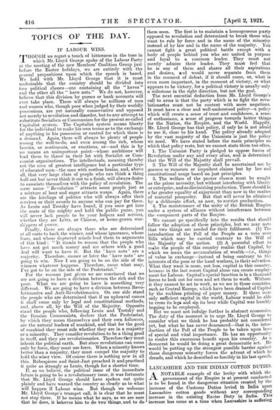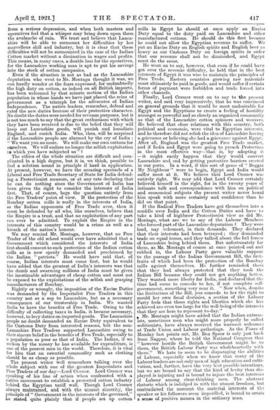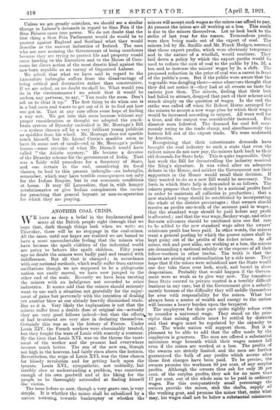LANCASHIRE AND THE INDIAN COTTON DUTIES.
ANOTABLE example of the levity with which the government of the Empire is at present conducted is to be found in the dangerous situation created by the increase of the Customs Duties levied in India upon Lancashire cotton goods without any corresponding increase in the existing Excise Duty in India. This increase has come at a time when Lancashire is suffering from a serious depression, and when both masters and operatives feel that a whisper may bring down upon them the avalanche of ruin. We trust and believe that Lanca- shire will be able to surmount her difficulties by her marvellous skill and industry,- but it is clear that these difficulties will not be surmounted in the case of the Indian Cotton market without a diminution in wages and profits. This means, in many cases, a double loss for the operatives, for the Lancashire working man is apt to put his savings into the stock of cotton companies. Even if the situation is not as bad as the Lancashire deputation who went to Mr. Montagu thought it was, we can hardly wonder at the fears expressed, for undoubtedly the high duty on cotton, as indeed on all British imports, has been welcomed by that minute section of the Indian population in whose hands we have just placed the reins of government as a triumph for the advocates of Indian Independence. The native leaders, remember, defend and extol the new duties because of their protective character.
No doubt the duties were needed for revenue purposes, but it is not too much to say that the great enthusiasm with which they have been received is due to the belief that they will keep out Lancashire goods, will punish and humiliate England, and enrich India. Who, then, will be surprised if the Lancashire people are alarmed by the cry of India : " We want you no more. We will make our own cottons for ourselves. We will endure no longer the selfish exploitation to which you have subjected us" The ethics of the whole situation are difficult and com- plicated in a high degree, but it is, we think, possible to find a solution sound in principle if hard in application. At present, however, we have the amazing spectacle of a Liberal and Free Trade Secretary of State for India defend- ing a Protectionist measure, or at any rate declaring that he can do nothing since the Government of India has been given the right to consider the interests of India first. That, of course, begs the question entirely from the Free Traders' point of view. If the protection of the Bombay cotton mills is really in the interests of India, as the Indian opponents of Free Trade aver, then it must be defended by all who, like ourselves, believe that the Empire is a trust, and that no exploitation of any part can ever be admitted. To exploit the Empire in the interests of this country would be a crime as well as a breach of the nation's honour.
We may remind Mr. Montagu, however, that no Free Trader of the old school would ever have admitted that a Government which considered the interests of India first should consent to such protection of the Indian cotton mills as is now openly demanded and proclaimed by the Indian " patriots." He would have said that, of course, Indian interests must come first, but he would have ;Aided that the greatest of India's interests was that the dumb and swarming millions of India must be given the inestimable advantages of cheap cotton and must not be exposed to the exploitations of the selfish and grasping manufacturers of Bombay.
Rightly or wrongly, the imposition of the Excise Duties was demanded by the Imperialist Free Traders in this country not as a sop to Lancashire, but as a necessary consequence of our trusteeship in India. We wanted India to have the benefits of Free Trade. Owing to the difficulty of collecting taxes in India, it became necessary, however, to levy duties on imported goods. The Lancashire people no doubt demanded an Excise Duty equivalent to the Customs Duty from interested reasons, but the non- Lancashire Free Traders supported Lancashire owing to their sincere belief in the benefits of Free Trade especially to a population so poor as that of India. The Indian, if we reckon by the money he has available for expenditure, is one of the poorest men in the world. Therefore, it is vital for him that an essential commodity such as clothing should be as cheap as possible. The present writer well remembers talking over the whole subject with one of the greatest Imperialists and Free Traders of our day—Lord Cromer. Lord Cromer was speaking of his line of action when confronted with a native movement to establish a protected cotton industry behind the Egyptian tariff wall. Though Lord Cromer always maintained, and with the utmost sincerity, the principle of " Government in the interests of the governed," he stated quite plainly that if people set up cotton mills in Egypt he should at once apply an Excise Duty equal to the duty paid on Lancashire and other manufactured cottons. He should do this first because he could not allow the Egyptian revenue to suffer. We put an Excise Duty on English spirits and English beer as heavy as our Customs Duty on foreign spirits in order that our revenue shall not be diminished, and Egypt must do the same.
He went on to say, however, that even if ho could have got over the revenue difficulty, he held that in the best interests of Egypt it was wise to maintain the principles of Free Trade. Eastern countries growing raw materials must ultimately be paid in goods, and would suffer if certain forms of payment were forbidden and trade forced into other channels.
Finally, Lord Cromer went on to say to the present writer, and said very impressively, that he was convinced on general grounds that it would be most undesirable for Egypt and the Egyptians to create a feeling of hostility amongst so powerful and so closely an organized community as that of the Lancashire cotton spinners and weavers. He believed that close relations with this country, both political and economic, were vital to Egyptian interests, and he therefore did not relish the idea of Lancashire having a grievance or believing she had a grievance against Egypt. After all, England was the greatest Free Trade market, and if India and Egypt were going to preach Protection inthe most effective way—that is, by adopting it —it might easily happen that they would convert Lancashire and end by getting protective barriers erected in our ports. In a word, if this sort of game of " Beggar My Neighbour " were to begin, Egypt and India would suffer most at it. We believe that Lord Cromer was entirely right. We may add that Lord Cromer certainly believed himself in the right, for in the twenty years of intimate talk and correspondence with him on political and economical subjects the present writer never heard him speak with more certainty and confidence than he did on that point.
If the Radical Free Traders have got themselves into a muddle over India and the Cotton Duties and have to take a kind of highbrow Protectionist view as did Mr. Montagu, what are we to say of the Labour Members who formed part of the Lancashire deputation ? They were loud, nay vehement, in their demands. They declared that their interests had been betrayed ; they demanded trade on equal terms, and they talked about the full forces of Lancashire being behind them. But unfortunately for them, as Mr. Montagu of course at once pointed out and rubbed in, the Labour Party gave valuable support to the passage of the Indian Government Bill, the first- fruits of which had been the protection of the Bombay mills against themselves. He further reminded them that they had always protested that they took the Indian Bill because they could not get anything better. They wanted more liberty for India, and declared that the time had come to concede to her, if not complete self- government, something very near it. " Now when, despite the limitations of the Bill, you concede to her the right to mould her own fiscal destinies, a section of the Labour Party feels that those rights and liberties which she has achieved are even too large for the well-being of the interests that they are hero to represent to-day." , Mr. Montagu might have added that the Indian extrem- ists, sometimes men who might more properly be called seditionists, have always received the warmest welcomes at Trade Union and Labour gatherings. As the Times of Monday last points out, Mr. Ben Spoor is only just back from Nagpur, where he told the National Congress that " however hostile the British Government might be to them, the British Labour Party was wholeheartedly with them." We hate to seem to be disparaging the abilities of Labour, especially when we know that many of the Labour leaders are not only men of high education and culti- vation, and, further, have the very best possible intentions, but we are bound to say that the kind of levity thus dis- played is injuring and is bound to injure the best interests of Labour among clear-thinking men. The abstract rhetoric which is indulged in with the utmost freedom, but contradicted the moment the material interests of the speaker or his followers seem imperilled, is bound to create a sense of positive nausea in the ordinary man. Unless we are greatly mistaken, we should see a similar change in Labour's demands in regard to Sinn Fein if the Sinn Feiners came into power. We do not doubt that the first thing a Sinn Fein Parliament would do would be to protect against England and Scotland what they would describe as the nascent industries of Ireland. The men who are now accusing the Government of being murderers because they are trying to protect life and property would come howling to the Executive and to the House of Com- mons for direct action of the most drastic kind against the new-born republic as an enemy of Organized Labour. We admit that what we have said in regard to the Lancashire imbroglio suffers from the disadvantage of being critical and destructive rather than constructive. If we are asked, as no doubt we shall be, What would you do in the circumstances 1 we admit that it would be useless, nay perverse, to say, " You made the mess. Don't ask us to clear it up." The first thing to do when one is in a bad mess and wants to get out of it is to find out how one got in. That at any rate offers some hope of finding a way out. We got into this mess because without any proper consideration or thought we adopted the crack- brain system of Dyarchy embodied in Mr. Montagu's Bill —a system thrown off by a very brilliant young publicist as sparkles from his wheel. Mr. Montagu does not sparkle much himself, but Mr. Lionel Curtis's sparkles seem to have lit some sort of candle-end in Mr. Montagu's politic bosom—some remains of what Mr. Disraeli would have called " the Asiatic mystery." He became a devotee of the Dyarchy scheme for the government of India. That was a fairly wild procedure for a Secretary of State, and one certain in the end, considering its fiscal clauses, to lead to this present imbroglio—an imbroglio, remember, which may have terrible consequences not only for the Indian Empire, but in our economic conditions at home. It may fill Lancashire, that is, with hungry revolutionaries or give Indian conspirators the excuse for preaching that general boycott or non-co-operation for which they are praying.




































 Previous page
Previous page